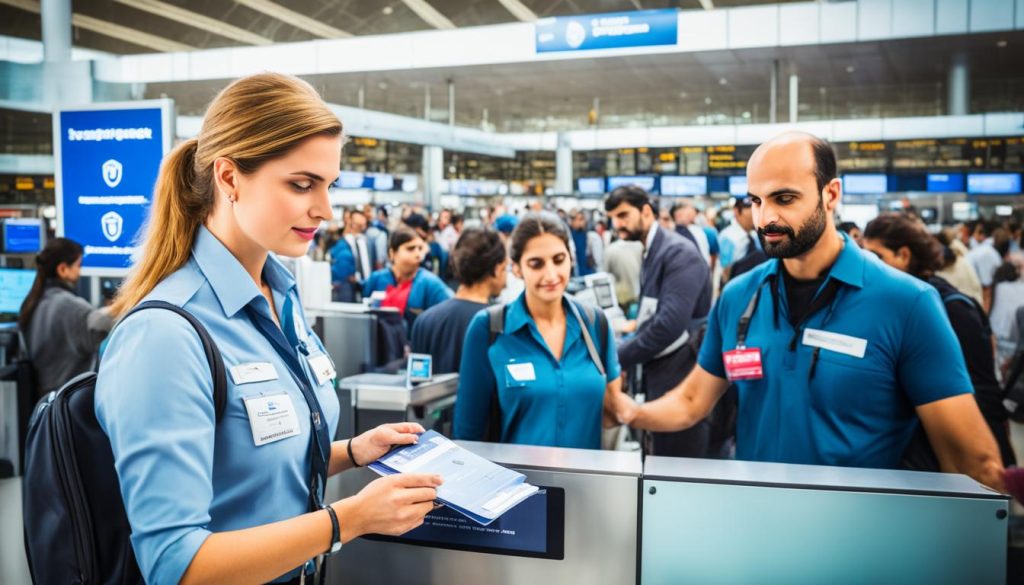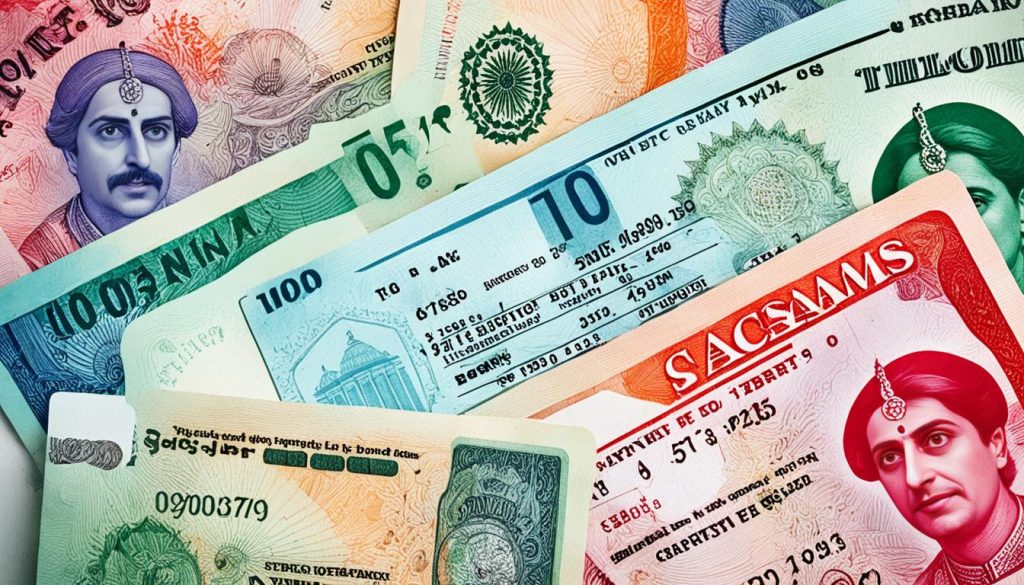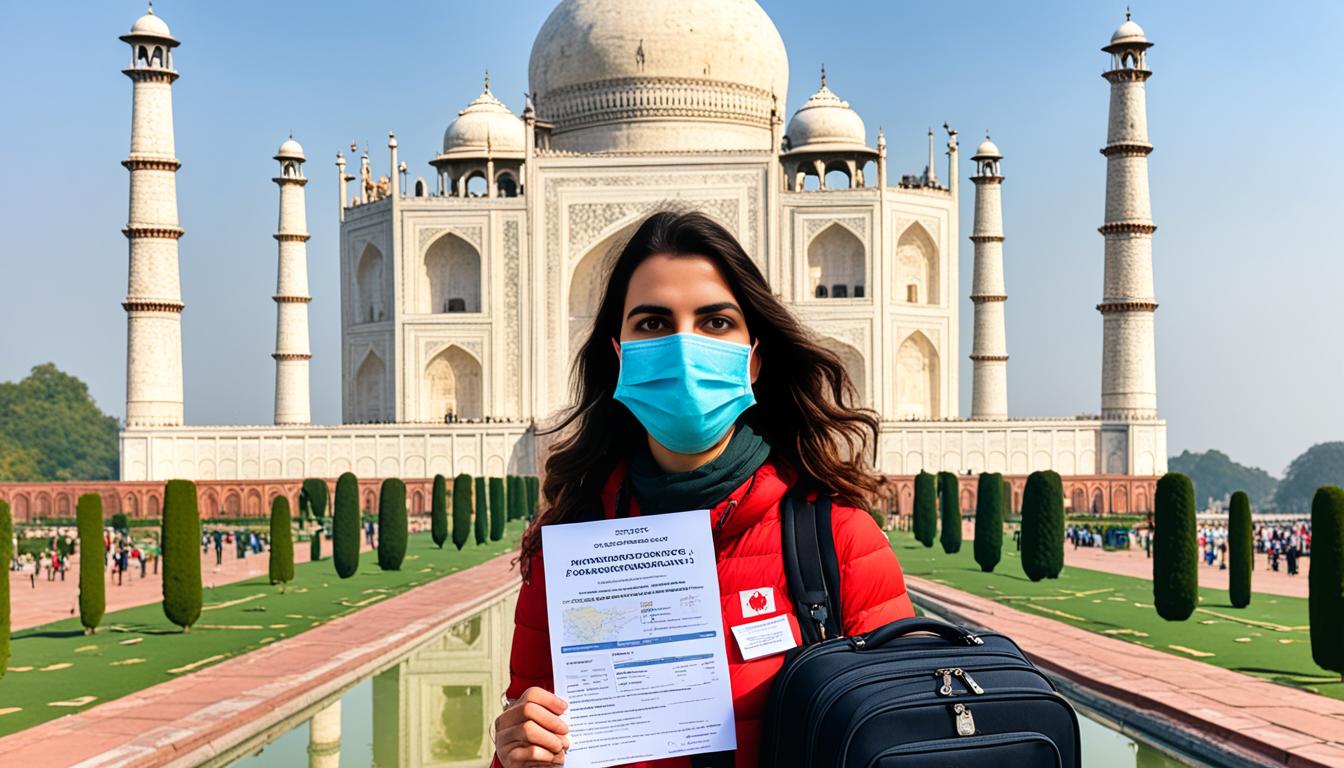Did you know that over 300,000 Canadians visited India in 2022, making it one of the top destinations for Canadian travellers? Whether you’re planning a business trip, a spiritual journey, or a cultural exploration, the process of travelling to India from Canada may seem daunting, but it doesn’t have to be. All Canadian citizens and permanent residents can travel to India, provided they have a valid passport and visa. Certain categories of Canadians, such as those with Overseas Citizenship of India (OCI), may even be visa-exempt for specific purposes and durations of stay.
In this comprehensive guide, we’ll explore the entry requirements, visa options, and important considerations for Canadians travelling to India. From navigating the visa application process to understanding the safety and security landscape, we’ve got you covered. So, if you’re a Canadian eager to experience the vibrant sights, sounds, and flavours of India, read on to learn everything you need to know before embarking on your journey.
Risk Level for Traveling to India
When it comes to travel from Canada to India, it’s important for Canadians to be aware of the overall risk level and various safety and security concerns. The risk level for travel to India is generally considered high, with several factors contributing to this assessment.
Safety and Security Concerns
One key factor is the upcoming elections in India, which can often lead to increased political tensions, demonstrations, and potential disruptions. Additionally, the security situation in specific regions of India, such as Jammu and Kashmir and parts of Northeast India, is of particular concern due to the presence of extremist and insurgent groups. Furthermore, the persistent threat of terrorism remains a constant worry for travellers to India.
Entry and Exit Requirements
For Canadians travelling to India, it is crucial to obtain a valid visa prior to departure. The visa application process can vary depending on the type of visa required, and travellers should familiarize themselves with the specific requirements. Additionally, health advisories recommend that Canadians ensure they have up-to-date vaccinations and take precautions against infectious diseases that may be present in certain regions of India.
Health Advisories
Canadians planning to travel to India should also be aware of the health advisories and recommendations issued by the Government of Canada. These advisories may include information on the prevalence of certain infectious diseases, the availability and quality of medical facilities, and the importance of taking preventative measures to maintain good health during the trip.
Safety and Security in India
When considering travel to India from Canada, it’s important to be aware of the potential security concerns and risk factors. The security situation in India can be volatile, particularly around upcoming elections, where demonstrations and protests may occur before, during, and after the voting process. These events can lead to traffic disruptions, curfews, and other disruptions that can impact the travel plans of Canadian citizens.
Upcoming Elections and Potential Disruptions
India’s elections are a significant event that can have a significant impact on the security landscape. Canadians planning to visit India should closely monitor the political climate and be prepared for the possibility of protests, rallies, and other events that could cause disruptions to their travel plans. It’s advisable to stay informed about the election schedule and any potential security measures that may be in place during this time.
Security Situation in Specific Regions
Certain regions of India, such as Jammu and Kashmir and parts of the Northeast, have heightened security concerns due to the presence of extremist and insurgent groups. Canadians should exercise caution when traveling to these areas and consult with local authorities or travel advisories for the latest information on the security situation. It’s important to be aware of any restrictions or permits that may be required to visit these regions.
Terrorism Threats
Terrorism remains a threat in India, particularly in states where Naxalite groups are active and during periods of national significance, such as Independence Day or Republic Day. Canadians should be vigilant, follow the instructions of local authorities, and avoid crowded areas or events that may be potential targets for terrorist activity.

Crime and Fraud Risks
Canadians travelling to India should be mindful of the potential risks of petty crime and fraud. Pickpocketing and purse snatching are common occurrences, particularly in major cities and tourist hotspots. It’s essential to take precautions when carrying valuables and to be aware of your surroundings at all times.
Petty Crime and Theft
Canadians should exercise caution when navigating crowded areas, such as markets, public transportation, and tourist attractions, as these are prime targets for pickpockets and bag snatchers. Keep your belongings, including your passport, wallet, and mobile phone, secure and close to your body. Avoid displaying expensive jewelry or electronics, as these can make you a target for theft.
Credit Card and ATM Fraud
Credit card and ATM fraud are also concerns for Canadian travellers in India. Be cautious when using your debit or credit cards, as skimming devices may be installed on ATMs or point-of-sale terminals. Whenever possible, use ATMs located inside banks or reputable establishments, and regularly monitor your bank statements for any suspicious activity.
Common Scams Targeting Foreigners
Canadians should be wary of common scams targeting foreign visitors in India, such as offers to export jewellery or gems at inflated prices, or unsolicited guided tours that lead to high-pressure sales. If an offer or situation seems too good to be true, it’s likely a scam. Trust your instincts and avoid engaging with unfamiliar individuals offering deals or services.

Women’s Safety Considerations
Travelling to India as a woman requires additional safety precautions due to the concerning prevalence of crimes against women, including sexual harassment and assault. Foreign women are often targeted and may face unwanted attention, staring, verbal abuse, groping, and other forms of sexual harassment, particularly in popular tourist destinations like Goa and Delhi, as well as on public transportation.
Crimes Against Women
Reports of rape and assault against foreign women have increased in recent years, highlighting the need for heightened vigilance and awareness. While efforts have been made to address these issues, the problem remains persistent, particularly in certain regions of the country.
Sexual Harassment and Assault
Instances of sexual harassment, ranging from unwanted advances to physical assault, are a significant concern for women travellers to India. Canadians visiting India must be mindful of their surroundings and take appropriate measures to ensure their personal safety.
Safety Tips for Women Travelers
- Avoid travelling alone, especially at night, and try to stay in groups whenever possible.
- Dress conservatively and avoid attracting unwanted attention.
- Be cautious when using public transportation and consider using trusted private or ride-sharing services.
- Avoid isolated or poorly lit areas and be aware of your surroundings at all times.
- Research and familiarize yourself with local laws and customs to avoid unintentional offenses.
- Carry a personal safety alarm or pepper spray, and know how to use them effectively.
- Trust your instincts and remove yourself from any situation that makes you feel uncomfortable or unsafe.
By taking these precautions and remaining vigilant, Canadian women can have a safe and enjoyable experience while travelling in India. However, it’s important to be aware of the risks and take appropriate steps to mitigate them.

Forced Marriages and Prevention
Forced marriage affecting foreigners, including Canadians, is a concerning issue in India. Some Canadians have been forced into marital arrangements without their prior knowledge or consent, and have been subjected to threats, intimidation, and violence by family members. If a Canadian is in Canada and believes they are being forced to travel overseas to marry, they should contact their local police for assistance.
Canadians planning to travel to India should be aware of the risks of forced marriage and take precautions to protect themselves. It is crucial for Canadians to research the laws and regulations surrounding forced marriage in India, and to familiarize themselves with the support services available to victims. By being proactive and informed, Canadians can reduce the likelihood of becoming victims of this abhorrent practice.

Demonstrations and Mass Gatherings
Canadians planning to travel to India should be aware that demonstrations and mass gatherings can pose significant disruptions. One such example is the ongoing violent protests that have erupted in Manipur State since May 2023, resulting in casualties and disruptions to traffic and public transportation.
Protests in Manipur State
The protests in Manipur State have led to the imposition of curfews in several districts, and mobile and internet services may be limited in the affected areas. Travellers to India, including Canadian citizens, should exercise caution and avoid these protest sites, as they can quickly turn volatile and lead to clashes with security forces.
It’s crucial for Canadian travellers to stay informed about the latest developments and advisories from the Government of Canada and the local authorities in India. Monitoring local news sources and travel alerts can help Canadians make informed decisions about their travel plans and ensure their safety during their stay in India.
Who Can Travel to India from Canada?
All Canadian citizens and permanent residents can travel to India, provided they have a valid passport and visa. Certain categories of Canadians, such as those with Overseas Citizenship of India (OCI), may be visa-exempt for certain purposes and durations of stay.
Visa Requirements for Canadians
Canadian travellers to India must obtain a valid visa prior to their trip. The type of visa required will depend on the purpose and duration of the visit. India offers various visa options for Canadians, including tourist, business, medical, and student visas.
Types of Visas and Eligibility
Canadians can apply for an e-Visa, which is an electronic visa that can be obtained online, or a regular visa through the Indian High Commission or Consulate in Canada. The e-Visa is available for tourism, business, and medical purposes, while other visa types cater to specific travel needs.
Canadians with OCI status may be eligible for visa-free travel to India for certain purposes and durations. OCI cardholders can stay in India indefinitely and have certain privileges, such as the ability to work and invest in the country.
Visa Application Process
The visa application process for Canadians involves submitting the necessary documentation, such as a valid passport, photographs, and supporting documents, either online or through the visa application center. Processing times can vary, so it’s recommended to apply for the visa well in advance of the planned travel dates.
Canadians should also be aware of the visa requirements for visiting restricted or protected areas in India, which may require additional permits or permissions.
Visiting Restricted Areas in India
Canadians planning to travel to India should be aware that certain regions within the country are designated as restricted or protected areas. These include the Andaman & Nicobar Islands, Arunachal Pradesh, Sikkim, and Nagaland. Accessing these areas requires additional permits and permissions beyond the standard tourist visa.
Restricted and Protected Areas
The Indian government classifies certain regions as restricted or protected areas due to their sensitive political, military, or environmental status. A valid tourist visa is not sufficient to visit these areas, as Canadians and other foreign nationals will need to obtain a separate Restricted Area Permit (RAP) or Protected Area Permit (PAP) in addition to their visa.
Obtaining Permits for Restricted Areas
To visit restricted or protected areas in India, Canadians must apply for the appropriate permit in advance. The application process may involve providing additional documentation, such as a letter of invitation or a recommendation from a government organization. The permit requirements can vary depending on the specific region, so it is crucial for travellers to research the necessary steps and comply with all regulations to avoid any issues or delays during their trip.
Pets and Travel to India
Canadians can bring their pets to India, but they must comply with certain customs and vaccination-related regulations. These requirements may vary depending on the airline and the specific destination in India, so it’s important for Canadians traveling to India to check with their airline and the Indian authorities beforehand.
Regulations for Bringing Pets
Pets traveling to India, including dogs and cats, must have up-to-date rabies vaccinations and a valid health certificate issued by a licensed veterinarian. The certificate should indicate that the animal is free from any contagious diseases and is fit to travel. Depending on the airline, additional documentation may be required, such as a pet passport or a pet import permit.
It’s crucial to note that certain breeds, such as Pit Bulls, Rottweilers, and Doberman Pinschers, may be subject to breed-specific restrictions or bans in India. Travellers should familiarize themselves with the local pet policies before attempting to bring their furry companions into the country.
Additionally, pet owners should be prepared to pay any applicable fees and charges, which can vary depending on the airline, the destination, and the size and weight of the pet. Some airlines may also have specific requirements for the pet’s travel carrier or crate, so it’s essential to check with the carrier well in advance of the travel date.
By understanding and adhering to the pet-related regulations for travel from Canada to India, Canadians can ensure a smooth and stress-free journey for both themselves and their beloved pets.
Passport and Visa Collection
After submitting a visa application, Canadians can track the status of their passport and visa application through the BLS International Services Canada Inc. website or by contacting their helpline. This allows applicants to monitor the progress of their application and be prepared for the collection of their passport.
Tracking Passport Status
The BLS International Services Canada Inc. website provides a convenient platform for Canadian travellers to check the status of their passport and visa application. By entering the required details, such as the application number or appointment ID, applicants can easily track the processing of their documents and stay informed about any updates or milestones.
Collecting Passports from BLS Centers
Once the visa application has been processed, Canadians will need to collect their passports from the designated BLS International Services Canada Inc. centres. These centres are conveniently located across Canada, making it accessible for travellers to retrieve their documents. Applicants should check the BLS website or contact their helpline to learn about the specific collection procedures and timelines for their application.
FAQ
1. Are Canadians allowed to travel to India?
Yes, all Canadian citizens and permanent residents can travel to India, provided they have a valid passport and visa.
2. What do Canadians need to travel to India?
Canadians travelling to India require a valid passport and visa. Certain categories of Canadians, such as those with Overseas Citizenship of India (OCI), may be visa-exempt for certain purposes and durations of stay.
3. Is the Indian visa open for Canadians?
Yes, the Indian visa is open for Canadians. Canadians can apply for various types of visas, such as tourist, business, or student visas, to travel to India.
4. How long can a Canadian citizen stay in India with OCI?
Canadians who hold an Overseas Citizenship of India (OCI) can stay in India indefinitely without the need for a visa. OCI cardholders are generally treated on par with Indian citizens for most purposes.
5. Can I live in India permanently with OCI?
Yes, Canadians who hold an OCI card can live in India permanently. OCI is a lifelong visa that allows the holder to live and work in India without the need for a separate residence or employment visa.
6. Can I travel to India with OCI only?
Yes, Canadians with an OCI card can travel to India without a separate visa. The OCI card serves as a visa for multiple entries into India and allows the holder to stay for an unlimited period of time.
7. Who can travel to India from Canada?
All Canadian citizens and permanent residents can travel to India, provided they have a valid passport and visa. Certain categories of Canadians, such as OCI cardholders, may be visa-exempt for certain purposes and durations of stay.
8. What are the travel restrictions from Canada to India?
Currently, there are no specific travel restrictions from Canada to India, apart from the general entry requirements such as obtaining a valid visa or OCI card. Travellers should be aware of the security situation and potential disruptions in certain regions of India.
9. What is the travel advisory from Canada to India?
The overall risk level for travel to India is generally high, with safety and security concerns related to upcoming elections, the security situation in specific regions, and the persistent threat of terrorism. Canadians are advised to exercise a high degree of caution when travelling to India.
10. Can I travel from Canada to India during COVID-19?
Yes, travel from Canada to India is currently possible, subject to the applicable COVID-19 entry requirements and health protocols in place. Travellers should check the latest updates and guidelines before planning their trip.




